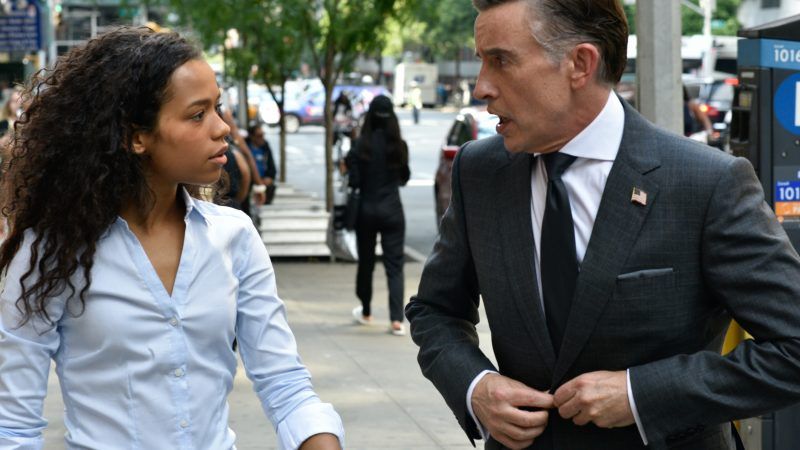Review: Hot Air
Steve Coogan takes on talk radio.

As an attack on right-wing radio, Hot Air is surprisingly inept. Steve Coogan, the movie's star (and an executive producer) is a smart, funny actor; but he's also a standard-issue English lefty (votes Labour, supports Jeremy Corbyn, detests Brexit), and it's easy to imagine that he never had any intention of giving a nuanced account of his character here, a slick New York talk-radio firebrand named Lionel Macomb. On the air, Macomb leads his callers in reviling illegal immigration (Lionel wants to build not just a wall, but a moat, too) and mocking official alarms about global warming. ("That's why I live in a penthouse," Lionel says. "Higher ground.") You get the idea.
You'd think Coogan—who demonstrated a mastery of smug cluelessness playing TV host Alan Partridge on the BBC, and who has had fun with sour disgruntlement in the three road-trip series he's made with Rob Brydon—would be just the man to do a witty takedown of this ugly American. But no—Coogan's performance is an exercise in simpleminded political gesturing: he hates this guy and what else is there to say? Unfortunately, that leaves the reins of the picture in the hands of director Frank Coraci, whose résumé is heavy with Adam Sandler and Kevin James movies (and who previously directed Coogan in a wildly unsuccessful 2004 remake of Around the World in 80 Days). And Coraci is himself chained to a strikingly mindless script by first-time screenwriter Will Reichel.
The story is a bagful of clanking plot stratagems. We meet Lionel in the studio, bonding as usual with his angry listeners. ("Bring me your rage.") Then we see a teenage girl named Tess (Taylor Russell) turning up at Lionel's door. She's the daughter of Lionel's good-for-nothing sister Laurie (Tina Benko), who's currently in rehab again. Lionel is supposed to be a heartless dick, and at first he does make huffy noises about turning Tess away—but he thinks better of them after she threatens reputational repercussions on Twitter. Okay, that's blackmail. But then, voluntarily, Lionel starts providing Tess with expensive clothing from Barney's and engineering her acceptance to a posh boarding school. Go figure.
Lionel's publicist and longtime girlfriend Valerie (Neve Campbell) is quickly stirred into the mix. Val knows that Lionel is a bit of an idiot (he only likes foie gras because it's illegal in California, she tells Tess), but hey, there's something about the guy. (Lionel is also cheating on Val with his hot housekeeper—a distasteful fact that the movie never deals with.)
When more plot conflict is called for, we learn that Lionel's ratings are beginning to slide. The immediate cause of this is a kinder, smilier young rival named Gareth Whitley (Skylar Astin), who was once Lionel's heir apparent. But there's also the possibility that the public has simply grown tired of Lionel's snotty schtick. On the street one day, we see him mobbed by protesters waving signs that say, "Talk's not cheap, it's toxic." This would seem to be a flat-out declaration by the filmmakers of an increasingly commonplace leftwing attitude toward the First Amendment (it's echoed on the movie's poster: "We all have a voice. Just be careful how you use it"). But then later, when one of the sign-wavers gets to express his views more fully on Lionel's show, he proves himself to be an empty-headed fool. Could this be an attempt to offer us another point of view? It feels more like clumsy plot construction.
Even viewers who might find the movie's message agreeable are likely to reject the puddle of shameless narrative goo into which it begins to sink toward the end. This is a redemption story that owes a lot to the 1976 Network—just not enough. In an on-air showdown with Whitley and a liberal senator (Judith Light), Lionel rounds on the live audience and blames them, not himself, for talk-media's affronts to common decency. "We just get rich and powerful by yanking your strings," he says. "Our best days are behind us…The American Dream is dead and buried and you're dancing on its grave."
Has Lionel seen the light? Did he actually just say, "Who cares about real feelings when you have emojis?" Can this movie get any dumber? Yes, I'm afraid. And yes, yes.


Show Comments (33)